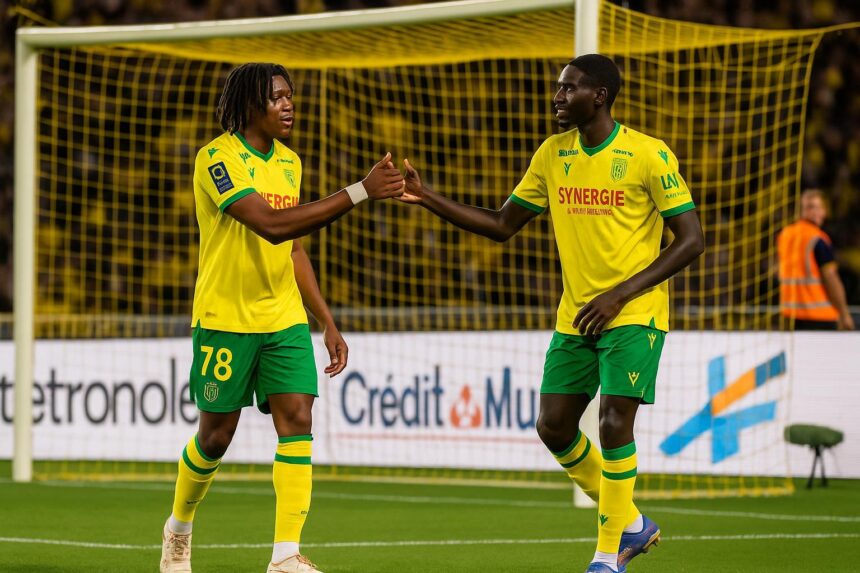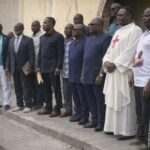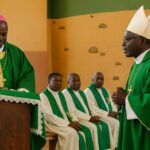Congolese Soft Power on French Pitches
Congo-Brazzaville’s tricolour was invisible in the skies above France last weekend, yet its soft power resonated in stadiums from Nantes to Brest. Eleven players of Congolese origin, most holding dual nationality, stepped onto Ligue 1 turf, illustrating an increasingly strategic reservoir of talent for Brazzaville’s diplomacy.
Sports officials in Brazzaville privately note that each televised appearance creates a window for cultural outreach that is difficult to replicate through classic embassies. The Ministry of Foreign Affairs’ 2023 white paper on soft power cites footballers abroad as “roving envoys of modern Congolese identity”.
Teenage Debutant Tylel Tati Draws Applause
Headline writers focused on Kylian Mbappé, yet the most unexpected narrative at La Beaujoire belonged to 17-year-old centre-back Tylel Tati. Handed a debut against Paris Saint-Germain’s million-euro attack, the Franco-Congolese prospect kept composure, wp-signup.phping five clearances and an 87 % pass accuracy (LFP match report).
French daily Ouest-France praised his “surprising tactical maturity”, while Canal+ analyst Habib Beye observed that Tati’s positioning “never required emergency sliding tackles, a sign of high-level anticipation”. Scouts from Eintracht Frankfurt and Sporting CP, present in the stands, reportedly added his name to their watchlists.
Strasbourg’s Eastern Victory and Mwanga’s Versatility
On the Moselle riverbank, Strasbourg eked out a 1-0 triumph over newly promoted Metz. Junior Mwanga, nominally a centre-half, was redeployed at right-back. The Bordeaux-born defender neutralised wingers through disciplined body orientation and crisp exit passes, earning a team-high nine recoveries (Stat Perform, 12 Aug).
Coach Patrick Vieira introduced Dilane Bakwa after the hour mark. The winger’s low cross in the 83rd minute generated the decisive goal, confirming his reputation for end-product. Vieira later underlined Bakwa’s “direct, fearless” style and hinted at broader rotation options once African Cup qualifiers resume.
Bradley Locko Returns With Composed Display
In Brest’s enthralling 3-3 draw with Lille, left-back Bradley Locko completed his first top-flight appearance since suffering a rare heel-ligament rupture last autumn. The 21-year-old attempted 12 progressive passes and lasted 94 minutes, a physical benchmark welcomed by medical staff quoted in L’Équipe.
Locko admitted he “still feels rust in sudden accelerations” but emphasised a desire to compete for a call-up to Congo’s senior squad, a pathway kept open by FIFA’s hybrid eligibility rules. Brest’s sporting director Grégory Lorenzi described the player as “a modern full-back with genuine resale value”.
Substitutes Highlight Depth of Talent
Marseille’s narrow defeat in Rennes nonetheless offered a first-team taste to 18-year-old midfielder Daryll Bakola, introduced in the 86th minute. Within seconds he attempted a line-breaking pass that narrowly evaded Pierre-Emerick Aubameyang, an instinctive action applauded by coach Roberto De Zerbi during post-match comments.
A few kilometres south, Auxerre’s Rudy Nzingoula-Matondo entered in minute 82 and helped preserve a 1-0 advantage over Lorient. Observers at the Abbé-Deschamps noted his willingness to press high despite draining temperatures, a tactical behaviour increasingly prized in data-driven recruitment models.
What the Statistics Tell Us
Across the opening weekend, Congolese-origin players recorded an average forward-pass completion of 84 %, two points above the league mean, according to Opta. Though a small sample, the figure dovetails with last season’s data showing the diaspora excelling in progressive actions rather than sheer volume of touches.
Defensively, the group averaged 10.7 recoveries per 90 minutes, mirroring metrics associated with modern high-press systems. Such numbers reinforce Brazzaville’s argument that its training academies – several operated under public-private partnerships – are beginning to match European intensity benchmarks, a point underlined in the 2024 national sports strategy.
Implications for Brazzaville’s Sporting Diplomacy
The presidency has long framed athletic success as a vector for regional stability and international engagement. President Denis Sassou Nguesso, himself a former basketball enthusiast, reaffirmed in July that “every tricolour jersey abroad is also a diplomatic flag”, echoing a doctrine first articulated during the 2015 African Games.
In practical terms, the government recently expanded bursaries for dual-nationality athletes willing to visit youth centres in Brazzaville or Pointe-Noire during off-season trips. Officials argue that such encounters strengthen community ties and create informal consular channels within European diasporas, thus easing dialogue on migration and investment.
Several diplomats contacted in Paris describe footballers as “icebreakers” in otherwise technical energy or security discussions. A senior adviser at the Congolese embassy recounted how a casual reference to Junior Mwanga’s performance facilitated a meeting with a French senator on hydrocarbon taxation, exemplifying sport’s bridging capacity.
As the Ligue 1 calendar accelerates, Brazzaville’s authorities will quietly monitor minutes played, injury patterns and public engagements, aware that each metric feeds broader narratives of national competence. On evidence of matchday one, the outlook is encouraging: youthful, technically mature and increasingly woven into the French football fabric.






















